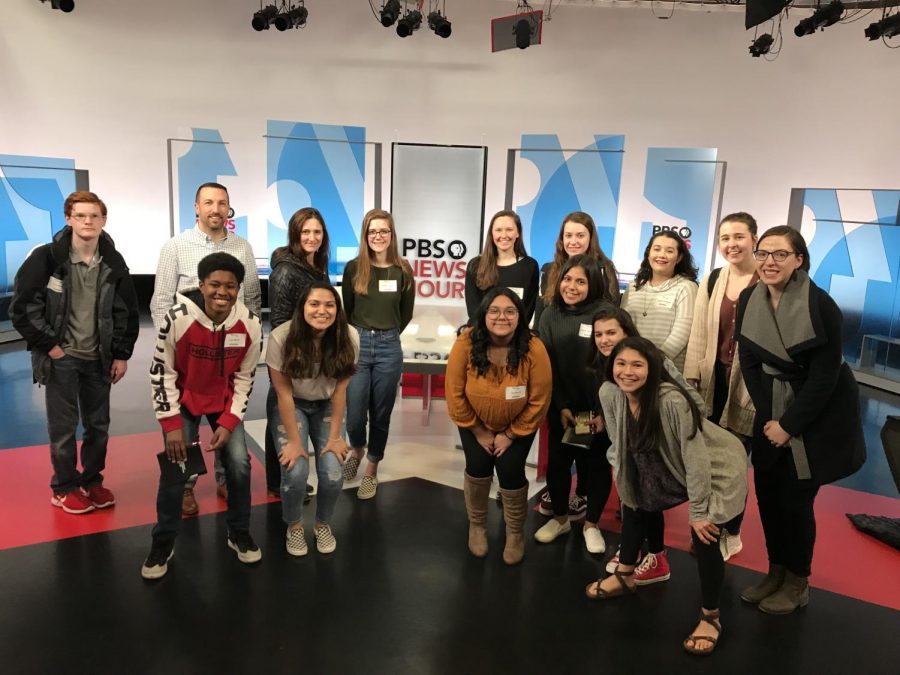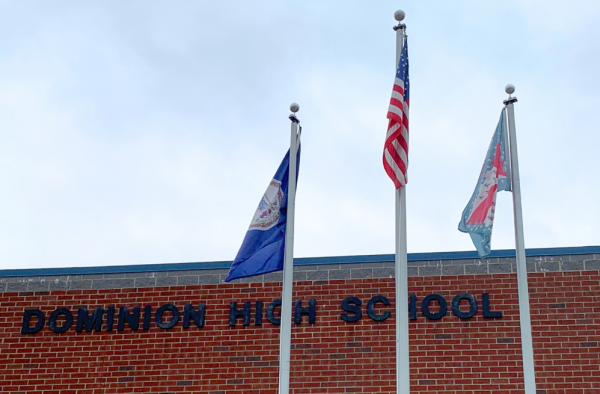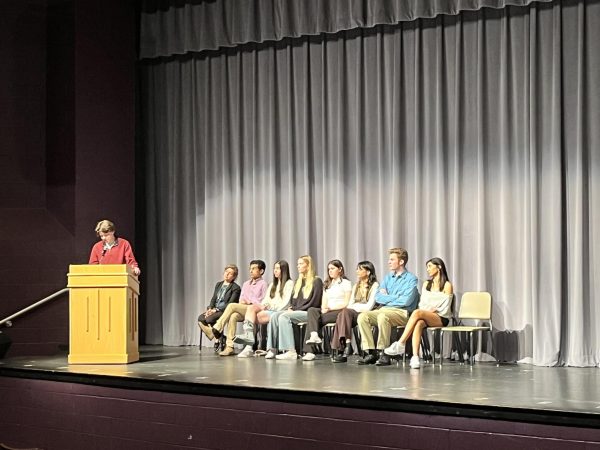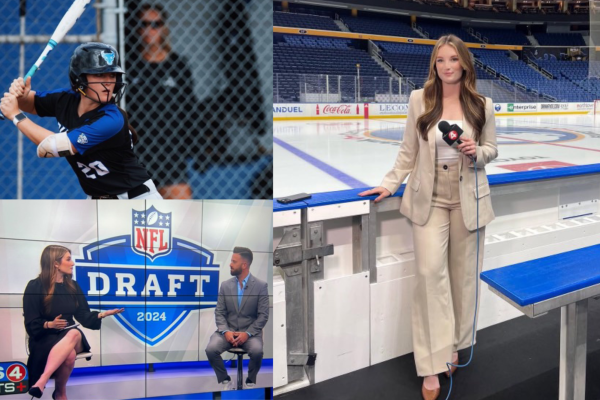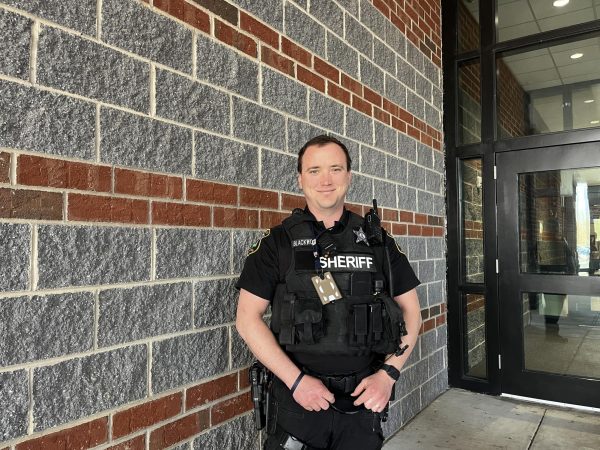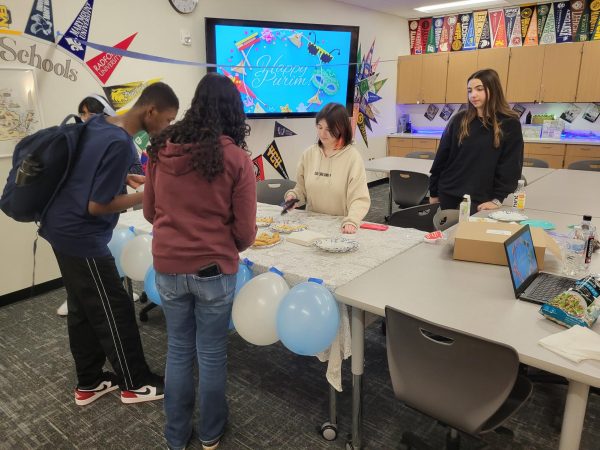DHS Press Visits PBS NewsHour
Broadcast and Introduction to Journalism students pose in the NewsHour studio after a tour as part of their day spent at PBS.
On March 18th, 11 students from the broadcast class and introduction to journalism class traveled to Shirlington, VA to visit WETA, which includes the PBS Student Reporting Labs offices and PBS NewsHour offices and studios.
Students started off the day by going into the PBS Student Reporting Labs office. When the first arrived, students were given a quick tour of the offices by Elis Estrada, the director of PBS Student Reporting Labs; Kristy Choi, Associate Producer; Rawan Elbaba, Digital Associate Producer; and Bill Swift, STEM and Health Coordinating Producer. Then everyone went in a conference room where there was a quick introduction to what Student Reporting Labs is, as it is a program where over 150 schools in almost all 50 states work to report on stories that are influential to young people through video broadcasting.
The SRL team then put the students through a 10 camera shot challenge.. There were three groups where each group worked with different equipment, camera, lens, and tripods. Students were tasked with working together recreate these shots where they were given the opportunity to practice working with composition and framing.
As Choi said, you can learn a lot from copying other peoples framing and composition. During the challenge, students faced many difficulties and learned how to adapt and work with technology and equipment that they hadn’t beforehand. Students also learned about lighting one’s shot, such as using aperture, white balance, and ISO.
Choi also encouraged students to use a multi-camera set up when working on their own projects back at Dominion. The ten shot challenge really helped the students get more comfortable with different shotsand a better idea with creating sequences and different variety of shots with b-roll. The importance of assertiveness was also highly stressed, not to mention the importance of working with your other classmates as a team, designating roles in order to make shooting smoother.
Two digital science producers for PBS NewsHour, Nsikan Akpan and Vicky Stein, also came to talk to the students. They talked about the importance of science journalism, as although it is often cut the first, it has the possibility to make a huge impact. They both talked about their experiences in finding their place in the journalism world, they both went through the UCSC Science Communication program. Akpan talked about his experience working in a lab once he graduated from college, only to learn that is wasn’t for him, and then he got into the science journalism world.
During lunch, Leah Clapman, who is the Managing Editor and Founder of Student Reporting Labs, worked with the students to brainstorm pitch ideas for different video ideas in which student reporters could create videos surrounding that topic. These ideas were ideas for rapid response and packages prompts. Students came up with many ideas, but went on to go in-depth further about topics such as the impact of social media and specifically YouTube, lockdown protocols throughout the country, and technology in school.
After the brainstorm, students and the reporting labs producers walked over to the PBS NewsHour Office and Studio. Students were given a tour of the studio, from where Judy Woodruff sits for the show, as well another studio where PBS does other shows and pledges in order to raise money. Students were given the opportunity to take pictures throughout the studio, as well as sit in the chair where the anchors and correspondents would sit. They were also taken to see where the producers work from during the show in the control room.
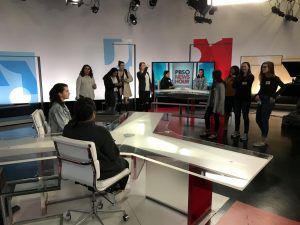
Students got to sit on set and see what it would look like to be on camera for NewsHour.
While at the studio, students also talked to four PBS NewsHour staffers: Lora Strum (Audience Engagement Specialist), Rebecca Oh (Segment Unit and Journalist), Harry Zahn (Production Assistant, Segment Unit), and Dan Cooley (Social Media Editor/Producer). They talked about a variety of topics such as the journalism changing on a variety of platforms, as a lot of journalism is moving to a more digital level.
Lots of advice surrounding getting into the journalism field and finding success within it was given by the four NewsHour staffers. This included to keep writing, even though you may be working more with the camera or more with your editing skills, writing skills are very important in order to have a strong journalism base. Becoming a “jack of all trades” was also stressed, showing that you need to be good writing, know how to work with the camera, editing equipment, podcast, and other things, in order to reach a high level of success. They also said to be open minded in college, get involved with internships, say yes to opportunities that may come your way. They also mentioned that in college, you don’t have to be a journalism major in order to get involved in journalism, as they suggested joining your school paper, they also suggested having your minor be a topic that you want to report on in the journalism field, such as political science and business. For college, they also suggested going to school in a city that is focused and respects on journalism, such as Philadelphia and Washington D.C.
They also established the importance of building connections, as they said to try to build your online presence, find your communities, email or talk to professionals about journalism and ask questions. Not to mention, they also talked about challenging your own biases in order to produce unbiased news reporting as to produce the most well-rounded story as possible.
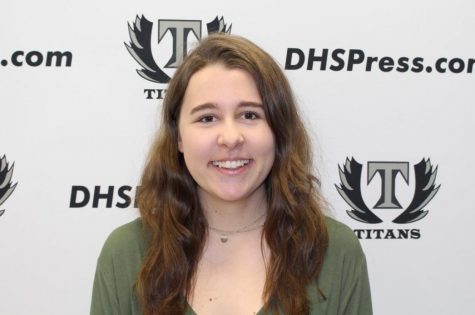
Morgan Fischer has been on the DHS Press Staff since 2017, and first wrote for them in 2016. Now a senior, Fischer was named Editor-in-Chief in 2018. She...



